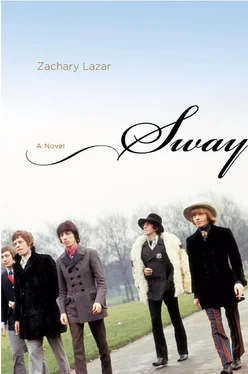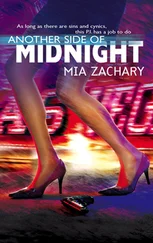He got in the Ford with Charlie and they headed south toward Los Angeles, listening to a faint scratch of music on the radio, not speaking. The rocks outside were gray, the plants a grayish green, the dirt tan. Everything was the color of dust, except the sky, which was a washed-out blue behind a thin yellow haze. At the little store outside of Chatsworth, they pulled over and Charlie bought a six-pack of beer and some things for the girls: a booklet of find-the-word puzzles, some candy bars.
Bobby started the car and backed up, looking over his shoulder. When they got on the highway, Charlie lit a joint, examining its smoke as it leached out the cracked window. He passed it over, his hand low, down by Bobby’s knee.
“You’re kind of quiet,” he said.
“I’m not quiet, I’m just wondering where we’re going.”
“We’re going to a friend of mine’s house. It’s nice there, peaceful. You’ll like it.”
They were on Highway 118, heading toward Topanga Canyon. They drove for a while, looking at the sparse houses surrounded by trees — oaks, sycamores, a few tall eucalyptuses. After the hills, they came eventually into the suburbs: gas stations, coffee shops, a movie theater.
“I always thought you were a nice kid,” Charlie said. “But I guess maybe there’s more to you than that. Like maybe you weren’t just bullshitting me about the time you spent in that reform school, for example.”
Bobby looked ahead at the road. “This is about Kitty, isn’t it?” he said. “Whatever Kitty told you.”
“What does that mean?”
“This little talk we’re having. Whatever this is. She knew about this.”
Charlie looked down at his lap, rubbing his knees with his hands. “You need to stop thinking so much,” he said. He brushed something off the dashboard with the side of his hand. “Turn up here,” he said. “Take a left.”
“Left?”
“Up here at the light. Put your signal on.”
Bobby turned from the wide boulevard onto a two-lane street, steering with one hand, the other on the vinyl armrest between them. They passed a Safeway supermarket on the corner, then a post office and a school, then they were in an ordinary neighborhood of small houses behind sidewalks and fences.
“That piano you had in your truck back there,” Charlie said. “I was just wondering, where were you taking that thing?”
Bobby looked at him blankly, not even understanding for a moment. “What?”
“That piano you had in your truck. I was wondering where were you taking it.”
“I was taking it to Gary Hinman’s. He’s buying it from me. I got it cheap at one of the auctions.”
“Yeah, well, I figured something like that. I was just wondering where you got that piece of shit in the first place. I wanted to make sure you didn’t find that on the ranch somewhere.”
“I bought it at an auction.”
“That’s what you said.”
“Yeah. That’s what I said. What is this?”
Charlie stared at him with an expectant frown, as if waiting for more. Then he turned away, and Bobby wished he had never seen the piano, or that he had found it on the ranch, that he had stolen it.
“I just wonder what goes on in that head of yours sometimes,” Charlie said. “Selling a used piano like that. Wasting your time.”
Bobby turned the knob on the radio. “I’m trying to make some money.”
“Yeah, well, money. There’s lots of ways to make money.” He passed the joint, not looking at Bobby. “What day is it today?” he said. “Friday?”
“I think it’s Thursday.”
“Not bad. Just driving around on a Thursday, getting high. Why don’t you just cool off and relax?” Charlie nodded then, his mouth half-open, drifting into some sort of sarcastic daydream. He had a way of miming his emotions, acting them out so that they came across as artificial and sincere at the same time. It was the way he played his guitar, dipping and bucking his head, giving himself up to the song, but also making fun of the idea of giving himself up to the song, making fun of you for believing it.
They drove on in silence. It was like this sometimes when you were Bobby. The way he looked — the fact that he was good-looking — made it hard for people like Charlie to believe that he really was who he was. They were always giving him nicknames — B.B., Cupid, Bummer — as if “Bobby” was too intimate, as if saying it was like kissing him on the lips. He remembered being out in the desert one time, just he and Charlie riding around in one of the jeeps, when Charlie had spiraled off into one of his moods, suddenly angry, hectoring and strange. The world was always at war, he’d said. It wasn’t just Vietnam, it was the nature of people, the way they made sense of things. Look at a newspaper and all you’d see were soldiers, riots, assassinations. You’d see things being pulled apart, sides forming, rifts widening: black and white, rich and poor, young and old. It was like everyone had looked down and finally seen that they were standing on a tightrope. They didn’t know which way to walk (that was the problem), they didn’t know how to choose. Some of them were so scared that they just wanted to fall off. They might seem harmless, but you had to be vigilant, because they wanted you to fall with them — that was the peculiar thing about their fear.
Bobby was usually embarrassed when Charlie talked this way. It seemed involuntary, a way of showing too much of his hand.
They turned at the next stop sign. The house on the corner was invisible behind its high brown fence, garbage pails in front, thick tufts of palm trees pushing out over the wooden slats.
“That’s it up there,” said Charlie. “Park up there a little ways.”
He raised his chin at one of the houses across the street. It was a Mexican-style bungalow with a carport off to one side, a front yard covered in smoothly raked gravel. There were cactuses and yuccas planted in little islands behind white bricks. It was so neat that it looked almost like an old toy that had been pressed into service as something real.
“I don’t think anyone’s home yet,” Charlie said. “Why don’t you let me have the keys.”
Bobby looked at him skeptically. Then he handed him the keys and Charlie nodded, clasping them in his hand.
“Just wait here for a minute,” Charlie said. “I’ll go and see if anyone’s there.”
He got out of the car and crossed the street, heading up the sidewalk that bordered the gravel yard. He had the sack of beer cradled in one arm, his free arm dangling at his side like a little boy’s. Bobby watched him walk around to the side of the house, following a winding path of concrete disks. Then he disappeared around the back, his head down.
Bobby wiped his eyes. He looked through the windows at the houses: ranch houses, Spanish houses, a miniature Tudor house with a lawn and a chain-link fence. The neighborhood seemed empty, abandoned for the day of work and school. It was like the neighborhood he’d grown up in: middle-class, somehow accidental. There were sidewalks, but nobody outside to walk on them.
He thought of Kitty, the way she had leaned her head on her shoulder last night, looking down at Charlie’s hand on her wrist, then back up at Bobby, her eyes sleepy, dismissive. Maybe she was just acting a part — you would see it happen around Charlie sometimes, a certain carelessness in people’s faces, a faint edge of sarcasm. Bobby had just kept talking — he’d been acting a little like Charlie himself, he realized now — staring at Charlie to show how little it mattered: he could have Kitty back, she was Charlie’s girl now, there were others. But the more he thought about it now, the more distorted the memory became, his face not calm but twitching a little at the cheeks, like a rabbit’s.
Читать дальше












